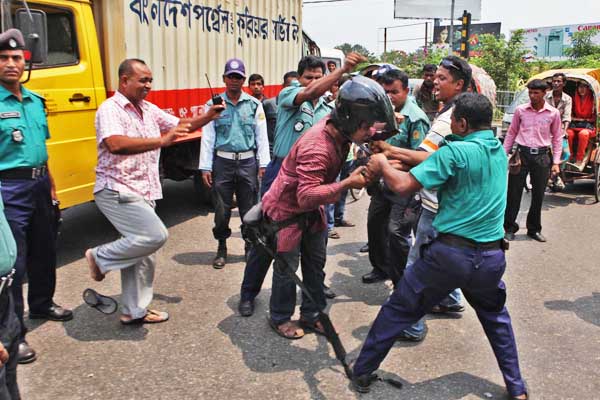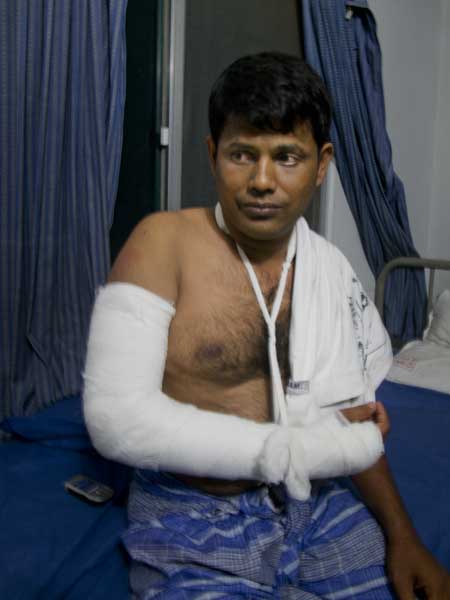Police beat up photojournalists in Dhaka. Agargaon. 11:00 am 26th May 2012.
?When you had taught us in class that we should be fighters, we had never anticipated this.? Said Shahadat Parvez Anchal, senior photojournalist of the Bangla Daily Prothom Alo and former student of Pathshala. We were standing by the bed of his colleague Sajid Hossain, who lay with his leg in a plaster in cabin 416 at the Trauma Centre in Shyamoli. True. I had told them to be fighters in the cause of justice. To resist oppression, to uphold peoples? rights. That in doing so they would become targets of the police, was something we hadn?t considered. We should have done.

?Break the arms and legs of any journalist you see? had been the message of an Awami League minister in Satkhira way back in 2000. Even before he had made these inflammatory remarks in October, Awami League activists had brutally assaulted two journalists in the space of a week. Three other journalists had been murdered in the area. Not only had Sheikh Hasina failed to prosecute these violent attacks, she appeared to be actively encouraging the perpetrators.
Why else would assistant commissioner Shahidul Islam say to Pathshala alumni and Prothom Alo photojournalist Zahidul Karim, “I’ve seen many journalists, beaten up many”, before punching, kicking and beating him with his baton? Zahid and his two colleagues, photojournalists Khaled Sarker and Sajid Hossain, had been covering a protest rally by students of the Women?s Polytechnic and Shere Bangla Nagar.

The police had refused the take the case against their own kin and had attempted to manufacture cases against the journalists instead. The attacks had been brutal, and a gang of policemen, some in uniform and some in plainclothes, had pounced upon the three photojournalists. Earlier photographs show the police trying to wrench off the motorbike helmet from one of them, no doubt ?better to beat you with?, as the wolf would have said.
As Sajid Hossain, Khaled Sarkar and Pathshala alumni Zahidul Karim, try to recover at the Trauma Centre, (they had been taken there from the government ?Hospital for the Disabled?), the questions must be raised as to why police felt they should prevent photojournalists from photographing a public rally. Why should they be beaten? How can the police refuse to take a case against a public assault? Why would they have attempted to frame false charges against journalists doing their rightful duty? What message must a senior police officer have received from the high command, to be openly about to say ?Beat the sons of bitches, beat the journalists. Nothing happens if you beat up journalists?.
Sure, the nine policemen have been suspended, and no doubt the government tomorrow will express its ?regret?. I wonder if the young wives of the three injured journalists will find much comfort as they maintain their vigil on the bedside of their partners at the Trauma Centre.
Hopefully these young photojournalists will recover. Hopefully they will still remember that their job is to be fighters in the cause of justice. But as they walk the same streets as the policemen who operate with impunity, out to get revenge, the hoped for ?regret? will sound hollow.
For those of us, who wonder why the recent murders of Pathshala teacher Sagar and his fellow journalist wife Runi, never led to any government action, the statement by the prime minister, that ?the state cannot protect people in their bedrooms? would inevitably lead to the question, if the bedroom is unsafe and the streets are unsafe, where was a journalist to go? Neither ?the grave? nor ?the hospital? is a comforting answer.
Related links:
Prothom Alo
BDNews24
Another Pathshala alumni, Monirul Alam’s blog

One thought on “Nothing happens if you beat up journalists”